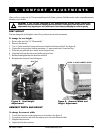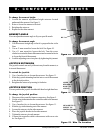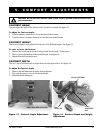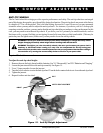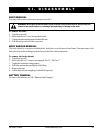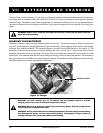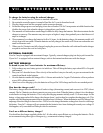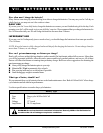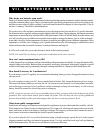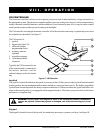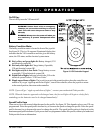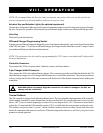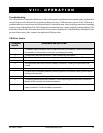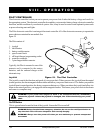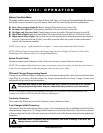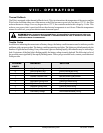
Jet 3/Rev I/Feb03 www.pridemobility.com 29
VII. BATTERIES AND CHARGING
Why do my new batteries seem weak?
Deep-cycle batteries employ a different chemical technology than that used in car batteries, nickel-cadmium (nicads),
or in other common battery types. Deep-cycle batteries are specifically designed to provide power, drain down,
and then accept a relatively quick recharge. Lead-acid batteries should be charged as often as possible. They do
not have a memory like nickel-cadmium batteries.
We work closely with our battery manufacturer to provide batteries that best suit the Jet 3s specific demands.
Fresh batteries arrive regularly and are promptly shipped with a full charge. During shipping, the batteries encounter
temperature extremes that may influence their initial performance. Heat will rob the charge from the battery, and
cold will slow the power available and extend the time needed to recharge the battery (just as with a car battery).
It may take a few days for the temperature of a battery to stabilize and adjust to its new ambient temperature. More
importantly, it will take a few charging cycles (partial drains followed by full recharging) to establish the critical
chemical balance that is essential to a batterys peak performance and long life.
It will be well worth it for you to take the time to break-in the batteries properly.
NOTE: The useful life of a battery is quite often a reflection of the care it receives.
How can I ensure maximum battery life?
A fully charged deep-cycle battery will provide reliable performance and extended life. So, keep the batteries fully
charged whenever possible. Batteries that are regularly and deeply discharged, infrequently charged, or stored
without a full charge may be permanently damaged, causing unreliable Jet 3 operation and limited battery life.
How should I store my Jet 3 and batteries?
If you do not use your Jet 3 regularly, we recommend maintaining battery power by charging the batteries at least
once per week.
If you do not plan on using your Jet 3 for an extended period of time, fully charge the batteries prior to storage.
Disconnect the battery harnesses and store the Jet 3 in a warm, dry environment. Avoid temperature extremes,
such as freezing or excessively hot conditions, and never attempt to charge a frozen battery. A cold or frozen
battery should be warmed for several days prior to recharging.
NOTE: If you are storing a Jet 3 for an extended period of time, you may wish to block the unit up off the
ground or floor with several boards placed under the frame. This will keep the tires off the ground and
prevent the possibility of flat spots developing where the tires rest on the ground or floor.
What about public transportation?
Sealed lead-acid and gel cell batteries are designed for application in power chairs and other mobility vehicles.
These batteries are Federal Aviation Administration (FAA) approved, allowing safe transportation on aircraft,
buses, and trains, as there is no danger of spillage or leakage. We suggest you contact the commercial carriers
ticket counter in advance to determine the carriers specific requirements.
If you wish to ship the Jet 3 to your final destination using a freight company, repack the Jet 3 in the original
shipping container and ship your batteries in separate boxes. Use only sealed lead-acid or gel cell type batteries
that are maintenance free. Do not use wet-cell batteries with removable caps.



